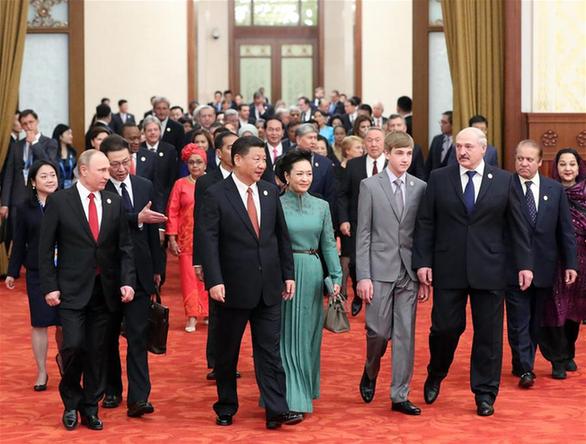Belt and Road Forum is a success, regardless of who joins
- By Sumantra Maitra
 0 Comment(s)
0 Comment(s) Print
Print E-mail China.org.cn, May 16, 2017
E-mail China.org.cn, May 16, 2017
|
|
|
Chinese President Xi Jinping, his wife Peng Liyuan and other distinguished guests of the Belt and Road Forum (BRF) for International Cooperation attend a welcome banquet in Beijing, capital of China, May 14, 2017. [Photo/Xinhua] |
Leaders from 29 countries attended the forum on Sunday and Monday, corroborating China's expanding economic links in Asia as well as Africa and Europe. At a time when there are winds of protectionism blowing across the West, this meeting sought to underpin billions of dollars of Chinese investment across the globe.
Leaders of major Chinese trade partners like Russian President Vladimir Putin, Pakistani Prime Minister Nawaz Sharif, Cambodian Prime Minister Hun Sen and Kazakh President Nursultan Nazarbayev were present, along with Western leaders like the prime ministers of Spain, Italy, Greece and Hungary. Greece is a notable presence, as President Xi is offering strong support to it to meet urgent needs for enhanced infrastructure and energy supply.
In a way, as President Xi Jinping mentioned, the Belt and Road Initiative as a "project of the century" is drawing inspiration from the ancient trade routes linking China with the world. The original trade route, ranged from "Cathay" to Rome, linking the most ancient civilizations of China and the West.
Over time, with the collapse of the Roman empire, and the rise of Arab tribalism, this route lost its glory. So, in that sense, this is merely restoring a return to equilibrium, with Xi pledging an additional 14.5 billion dollars for China's Silk Road Fund.
Notable absent in all this discussion is India. In fact, an Indian presence was strongly urged by the Chinese side. As the Hindustan Times reported: "Beijing dispatched dozens of invites directly to the top ceremonial and political offices, to several current ministers, diplomats, former envoys besides scholars and journalists from India, to attend the BRF."
Unfortunately, the response was always predictably "sorry, but…" from the Indian side. The Ministry of External Affairs has not formally made any comments on participation in the two-day meeting, maintaining a diplomatic silence.
This, surely, is a major flaw in the Indian grand strategy. Firstly, India is not stopping the economic coalescing of Asia. In fact, India is part of other economic initiatives including AIIB. This initiative is solidifying the investment of hundreds of billions of dollars in Asia, including in India's neighborhood, Pakistan, Sri Lanka, and Bangladesh all present at the BRF.
Even more importantly, the United States finally did a seeming U-turn to join in, with the presence of a White House adviser, indicating the Trump administration's belated understanding of the importance of this summit. This comes immediately after the trade deal between China and the United States. China is going to allow the import of U.S. beef under the new agreement, and, U.S. is to allow the import of cooked poultry from China.
China will also permit foreign financial service companies to provide credit-rating services in China. The U.S. Treasury claimed the deal as "Herculean" and attempted to portray it as a sign of normalization of Sino-U.S. relation.
So, what did India gain from this show of diplomatic pride? Nothing, in short. While there could be valid concerns about geopolitics and statements are sometimes made by non-participation and boycotting, it is not clear what, ultimately, is the Indian grand strategy, and what it wanted to achieve.
The biggest flaw in the argument was looking at the Belt and Road Initiative (BRI) from a geopolitical rather than an economic viewpoint. BRI is primarily an economic initiative, which provides a much-needed investment infusion amidst global glut and middle income trap in Asian economies. Not joining in the initiative doesn't mean throwing a spanner into the works, just economic isolation.
There are questions of geopolitics between India and China, just as there are between China and U.S. While American response shows a sign of belated maturity and realism, Indian response shows petulance.
As Kautilya stated in Arthashastra in the fourth century BCE, diplomacy or military power or ideology doesn't solidify a great power position, as much as economics does. Perhaps Indian policymakers might want to reread such centuries-old wisdom.
Sumantra Maitra is a columnist with China.org.cn. For more information please visit:
http://www.china.org.cn/opinion/SumantraMaitra.htm
Opinion articles reflect the views of their authors only, not necessarily those of China.org.cn.







Go to Forum >>0 Comment(s)